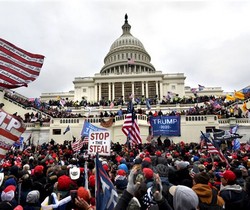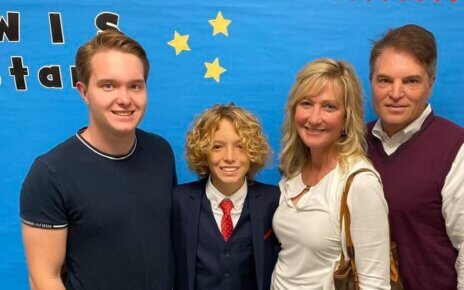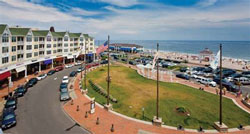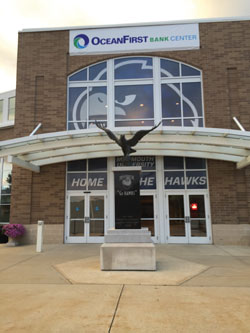University faculty held a virtual panel discussion in response to the Jan. 6 attack on the U.S. Capitol Building. During the event, titled “The White Supremacist Terrorist Siege on the U.S. Capitol: The Roles and Responsibilities of Universities in Times of National Crisis,” faculty explored the motives behind the siege through their various disciplines.
The event, held on Martin Luther King Jr. Day on Jan. 18, also honored the legacy of MLK’s strives towards racial equality in America.
Moderated by Johanna Foster, Associate Professor of Sociology, panelists included Dr. Steve Chapman (Political Science), Dr. Manuel Chavez, (Philosophy), Dr. Chris DeRosa (History), Dr. Walter Greason, (Educational Counseling & Leadership), Dr. Jen McGovern (Sociology), and Dr. Marina Vujnovic (Communication). The event was co-sponsored by the Helen Bennett McMurray Endowment in Social Ethics, the Sociology Program, and the Program in Gender and Intersectionality Studies. The event gathered approximately 90 participants.
“For some of us today we also gather inspired by Dr. King’s enduring critique of the dangerous intersection of white supremacy, global capitalism and unconscionable wealth and equality, and US militarism and imperialism,” Foster said to commence the panel discussion.
She continued, “We have a terrific group of faculty here from across the disciplines at Monmouth to give voice to the terrible events on Jan. 6 and to help us better understand and reflect on that truly terrifying spectacle, what it might mean for our nation, what it might mean for Monmouth University, and how we can move forward together as a community.”
As an Assistant Professor of Political Science, Chapman explained that one of the key lessons of the attack on the Capitol is the importance and power of elite messaging. He said, “In political science, we spend a lot of time about how messages from elites filter down through the media and to the masses and how that can shift human behavior. Cleavage-based politics comes down to in-group out-groups when you’re trying to split voters into these groups for an electoral advantage…Jan. 6 is a stark example of how the elite messaging can create some human cost.”
Following Chapman’s commentary, Greason offered another interpretation of the siege from the perspective of education.
“There’s this distrust of expertise that leads to an undermining of legitimate authority,” Greason said. “If there is no truth or if there is no legitimate knowledge, there can be anarchy on an everyday scale.”
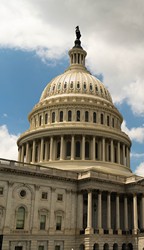
Meanwhile, DeRosa weighed in with a historical perspective. “When we look at the 6th of January, our impulse is to find out what broke down. We could look at the cultivation of separate realities that are politically reinforcing, we could look at the lingering embers of reengaged fire of white supremacy…and all these things are worthy of concern, but I would also urge that we look at what didn’t break down.”
“There’s also a really important point to make about tacit white supremacy,” Chapman said, also observing a difference between the Capitol riot and the Black Lives Matter protests in June following the murder of George Floyd by a police officer. “The events of Jan. 6 were white supremacy involved,” Chapman said. “The way [the rioters] reacted to police like they were almost offended that the police would try to stop them…that shows the privileged position in society.”
The faculty also discussed the Capitol riot’s implications on Monmouth University, exploring the role and responsibility of U.S. institutions and universities during times of national crises.
“It’s something that probably touched all of our students,” McGovern said. “You didn’t have to be in DC to know what was going on…those tensions are coming up in their own family…it may be hard to focus…I think we can teach this (debate) and model…respectful debate, to teach them that there are ways to disagree.”
“We grow as people the more that we know,” Greason said. “Engaging and unpacking our current moment is what we can start to do in this conversation.”
“The goal of us as educators is to find student opportunities to use and exercise those skills as critical thinkers,” Chavez added.
Chapman contributed to the conversation by re-emphasizing the importance of a liberal arts education. “Not only should we leave students with knowledge and critical thinking skills, but also the scientific process and the interconnectedness of everything,” he said. “I always hear my advisees ask, ‘why do I have to take this class? It has nothing to do with my major.’ It’s those classes that really build up the different layers of analysis that you can kind of surround yourself with.”
Vujnovic, Associated Professor of Journalism and Chair of the Faculty Council, added to the discussion of truth that Greason examined earlier in the conversation. “Whenever I would go to the Great Gall, I pass by the old Monmouth college seal and it says, ‘truth, leadership, service.’ And I always felt that’s the real mission of the University, which unfortunately I feel that we and universities in general have abandoned,” she said. “We are allowing our curriculum to be increasingly stripped of these kinds of ideas. I think we need to look hard into what we do as individuals and hold ourselves and our institutions accountable to when we fail to meet these goals.”
Foster concluded the discussion, “We hope the conversation continues in your classrooms and beyond and in ways that resonate with Dr. King’s cogent power analyses and his call to courage. Not only when it’s safe or popular, but when it’s right. It’s so wonderful to have the opportunity to come together in this way.”
A few days before the panel discussion took place, President Leahy also issued a statement to the University community via email on Jan. 12 condemning the attack.
“As we continue to combat an ongoing global pandemic, and persevere in the fight for racial justice, we witnessed [on Jan. 6] an unprecedented and disgraceful attack on the United States Capitol and the basic tenets of democracy that undergird our rule of law and sense of community,” Leahy wrote. “Like so many of you, I have spent the past week reflecting on the attack on our Capitol, which was at once an attack on our democratic ideals and on our sense of justice and equality…As an American, I condemn these acts in the strongest way possible.”
Leahy’s statement also addressed the role of Monmouth University on a national scale. “I am encouraged by the good work on our campus to educate our citizenry, to develop the next generation of compassionate leaders, to uphold democratic ideals of free speech and mutual respect, and to foster a decidedly antiracist campus community,” he wrote. “While our nation remains divided, let us continue to do our small part to heal it.”
IMAGE TAKEN from NBC News
PHOTO TAKEN form Pexels.com

